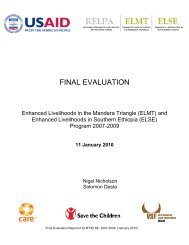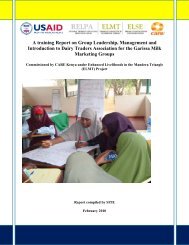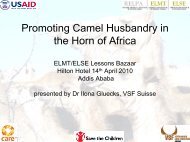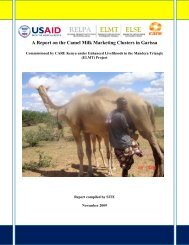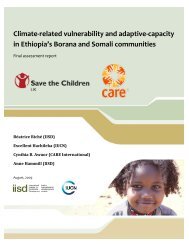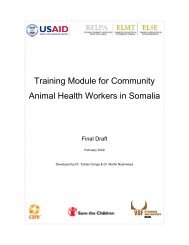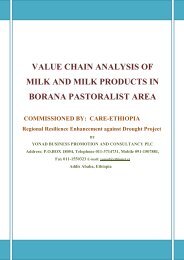care international in ethiopia – pastoral drop out study - ELMT Home
care international in ethiopia – pastoral drop out study - ELMT Home
care international in ethiopia – pastoral drop out study - ELMT Home
You also want an ePaper? Increase the reach of your titles
YUMPU automatically turns print PDFs into web optimized ePapers that Google loves.
livestock and the range resource they depend on for reproduction is everyth<strong>in</strong>g to make<br />
livelihood. The FGD participants further reiterated that be<strong>in</strong>g a livestock owner is important<br />
but not a sufficient condition by itself for one to be classified as a <strong>pastoral</strong>ist. A <strong>pastoral</strong>ist<br />
should have the skill and the knowledge to take good <strong>care</strong> of his animals and the resource on<br />
which they depend <strong>in</strong> order to reproduce and provide livelihood to people. A <strong>pastoral</strong>ist has<br />
to <strong>in</strong>volve directly <strong>in</strong> the whole management of his herd. In <strong>pastoral</strong> areas there are many<br />
people who support themselves by sell<strong>in</strong>g fire wood, water, petty trad<strong>in</strong>g or cultivation.<br />
Such people are still classified as <strong>pastoral</strong>ists no matter how small is the herd they own or<br />
stockless they may be as long as they meet the condition stated above, i.e., herd<strong>in</strong>g and<br />
manag<strong>in</strong>g livestock and the natural resource base of the system.<br />
In the FGD conducted with <strong>pastoral</strong>ists who hosted <strong>drop</strong><strong>out</strong>s, a sharp division transpired<br />
between the participants on the question where to categorize a stockless person who lives <strong>in</strong><br />
<strong>pastoral</strong> areas by provid<strong>in</strong>g herd<strong>in</strong>g labor services to wealthier households. Less than half of<br />
the members said a person who lives <strong>in</strong> <strong>pastoral</strong> area but does not raise his own livestock<br />
cannot be called a <strong>pastoral</strong>ist while the majority said as long as one lives <strong>in</strong> a <strong>pastoral</strong> area<br />
and <strong>in</strong>volved <strong>in</strong> herd<strong>in</strong>g be it his own herd or other people’s, it does not matter, he can be<br />
classified as a <strong>pastoral</strong>ist. However, all agreed that if an <strong>in</strong>dividual who is a stockless or and<br />
who lives <strong>in</strong> <strong>pastoral</strong> area but doesn’t <strong>in</strong>volve <strong>in</strong> one way or another <strong>in</strong> <strong>pastoral</strong> activities<br />
such as herd<strong>in</strong>g, water<strong>in</strong>g of animals he can’t be classified as <strong>pastoral</strong>ist. He is considered as<br />
a useless person (nyattu) and can be even cast <strong>out</strong> of the society. Also, all agreed that there is<br />
no as such a threshold number of livestock one should own to be classified as <strong>pastoral</strong>ist.<br />
Like <strong>in</strong> any other social group<strong>in</strong>g there are wealthy as well as poor <strong>pastoral</strong>ists. A stockless<br />
person who stayed with<strong>in</strong> the community is locally described as “qolle” while a <strong>pastoral</strong>ist<br />
who moved <strong>out</strong> of the <strong>pastoral</strong> area unwill<strong>in</strong>gly to either urban or peri-urban area was<br />
traditionally referred to as “nama nyaphati gale or eltma”, literally means a person who jo<strong>in</strong>ed<br />
alien community. Such a person is detached completely from his <strong>pastoral</strong> root and can’t be<br />
identified as a <strong>pastoral</strong>ist; such a person is rather considered as a <strong>drop</strong><strong>out</strong>. A qolle who stays<br />
among the <strong>pastoral</strong> community can support his family through herd<strong>in</strong>g other people’s<br />
livestock. His household members can provide their labor to assist the herd owner <strong>in</strong><br />
water<strong>in</strong>g, clean<strong>in</strong>g, etc. The wife can also assist <strong>in</strong> household activities. Even the small<br />
children of the head can assist <strong>in</strong> herd<strong>in</strong>g the small stock of the herd owner.<br />
28




